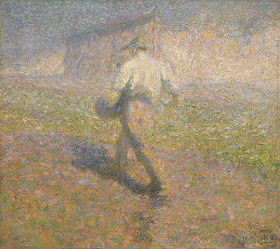. . . A benefit should be invested in
the same manner as a treasure buried deep in the earth, which you would not dig
up unless actually obliged.
Why, what opportunities of conferring
benefits the mere house of a rich man affords! For who considers generous
behavior due only to those who wear the toga? Nature bids me do good to
mankind—what difference does it make whether they be slaves or freemen,
free-born or emancipated, whether their freedom be legally acquired or bestowed
by arrangement among friends?
Wherever there is a human being, there is
an opportunity for a benefit. Consequently, money may be distributed even
within one's own threshold, and a field may be found there for the practice of
freehandedness, which is not so called because it is our duty towards free men,
but because it takes its rise in a freeborn mind.
In the case of the wise man, this never
falls upon base and unworthy recipients, and never becomes so exhausted as not,
whenever it finds a worthy object, to flow as if its store was undiminished. .
. .
—Seneca
the Younger, On the happy life,
Chapter 24 (tr Stewart)
Those
who are of the selfish sort treat any benefit simply as one half of an
exchange, and will constantly demand their payment, with interest. I learned
the hard way that friendship is often twisted into a transaction that continues
only as long as there is a profitable return. Those who are of the giving sort will
also invest, not for their own gain, but for the gain of others, and they seek
assistance only when in need.
Similarly,
he who lives by Fortune will only grant benefits to those who are fortunate,
those who wear the toga, because he wishes to share in their worldly
prosperity. The man who is poor, sick, or weak is of no interest to him. But he
who lives by Nature, by the merit of his own good deeds alone, has a much wider
field to work in, because each and every person is an opportunity for giving
benefit. Any man, whatever his position or circumstance, is of interest and
concern to him.
The
concepts of benefit, favor, or patronage only take on sinister tones in the
hands of sinister folks. I remember someone in Boston who was in principle a
Republican, but would only contribute money to campaigns by Democrats. This was
because the Republicans were rarely elected in that state, and they could
hardly provide a civil service promotion in return for the support. That is how
favors, and politics, get a bad name.
No,
those worthy of a benefit are all of those who will employ it to improve their
own character, rich or poor, healthy or sick, powerful or weak, though it will
be most needed by those who are poor, sick, or weak. Its return is measured by
how an act of charity will permit others the means for further acts of charity,
and there is wisdom to the old saying that kindness should always be passed on.
It may even return back to its source.
What
Seneca calls freehandedness is not free because it is only given to other free
men, but because it comes from the conviction of someone who is free in his own
thinking, who is his own master, and therefore not bound like a slave to the service
of his circumstances.
The good
man will sow freely in his field, though he is a fool to sow on barren ground. He
farms not merely for his profit, but to feed people, friends and strangers
alike.
Written in 5/2004
Image: Ivan Grohar, The Sower (1907)

No comments:
Post a Comment